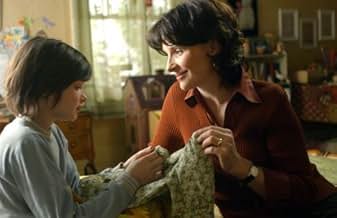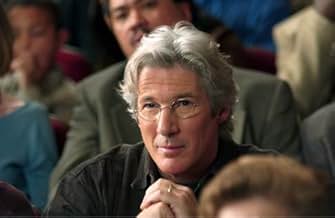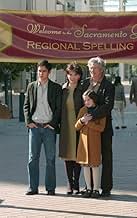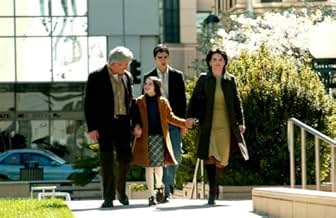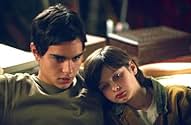Adicionar um enredo no seu idiomaWife and mother Miriam begins a downward emotional spiral as her husband avoids their collapsing marriage by immersing himself in his 11-year-old daughter's quest to become a spelling-bee ch... Ler tudoWife and mother Miriam begins a downward emotional spiral as her husband avoids their collapsing marriage by immersing himself in his 11-year-old daughter's quest to become a spelling-bee champion.Wife and mother Miriam begins a downward emotional spiral as her husband avoids their collapsing marriage by immersing himself in his 11-year-old daughter's quest to become a spelling-bee champion.
- Direção
- Roteiristas
- Artistas
- Prêmios
- 1 indicação no total
- Direção
- Roteiristas
- Elenco e equipe completos
- Produção, bilheteria e muito mais no IMDbPro
Avaliações em destaque
The movie moves too fast, though I can understand because of time limit, to actually give the viewers the concepts that the book gives. A lot of details and events are cut from the book that is important to the story as a whole. The script seems undeveloped, and the actors/actresses carried out their character with mediocre performances.
Saul (Richard Gere) is somewhat true to his character. The only thing he is obsessed with is to enable Eliza to communicate with God. He does this in a way that is the most true to novel.
Aaron's (Max Minghella) appearance is very different from that described in the book. He is described as a pale and scrawny young man, who is incapable of getting dates and is a social outcast. His search for a new religion seems unreasonable and spontaneous in the movie, and I thought it didn't really capture his true character.
Miriam's (Julliete) kleptomania is weird in both the book and the movie. Her actions in the book seems more reasonable when I knew her purposes for doing it. In the movie I thought it was a very random thing for her to do.
Eliza (Flora Cross) is a young actress, and is limited to what she can do. Her acting is very mediocre at best, and does not convince me of Eliza that is in the novel.
Chali, which I am surprised to see, have been transformed from a middle-aged man into a young blond girl. I can understand why they did that, but that just adds to the falseness of Aaron's character.
Overall I think the movie is an average depiction of Bee Season. I can't say that they did a nice job of sticking to the plot. It's almost impossible to transform a novel into a movie with everything in the book.
The film blends a family drama with two popular interests, the Kabbalah and spelling bees. Unfortunately, the gimmicky celebrity populism of the former is accentuated with the wincible casting of Richard Gere as the father who is supposed to be a Talmudic scholar with a dissertation on Jewish mysticism.
When he was shown giving a simplistic lecture at multicultural UC Berkeley on the theme of tikkun olam (repairing the world) that is echoed throughout the film, I felt the only way I could accept him in the role at all would be to assume he was a gentile intro to comparative religion teacher, even though he has lines denigrating Jews who chant Hebrew in synagogue without understanding the language and about inspiring his French Catholic wife to convert. He does put across well how the patriarch bullies the family emotionally and controls them with food, rigid standards and attention, like a more subtle Great Santini, but he lacks the pale intensity of the obsessed and just seems another NPR-listening, Bach-duet playing intellectual.
Until the involving climax, though, there are ironically very little Hebrew numbers as letters to guide the secrets of the universe in the movie when the dad takes his spelling wunderkind daughter under his wing to teach her the power of language, but it does lead to the most powerful scenes in the film of letting us see what's going on inside her head. Flora Cross in her debut is the anti-Dakota Fanning in absolutely convincing us that she is in thrall to a supernatural gift and that her kabbalistic studies, which are usually forbidden to young people for their psychological dangers, are opening her up to hidden reservoirs of perception. It is completely exceptional that special effects can be so extraordinary and important to an intellectual family story, but they are not only enchanting but demonstrative. Cross naturally communicates how she intuitively is in touch with a force that her father can only enthusiastically theorize and not quite capture himself.
The sharp editing is superb at clarifying cross-currents from the book, and perhaps making it much easier, perhaps a bit too simplistically, to see how each member of the family is seeking the face of God in their own way. The son, dark heart throb in the budding Max Minghella, is, as usual, seduced by a bland blonde shiksa, Kate Bosworth, though with an unusual rebellious religious twist that here seems natural to the Berkeley environment. But then his Jewish religious education seemed pretty random.
The editing and the special effects also marvelously contrast the paternal theme with the other fractured visual theme of the kaleidescope that the mother favors. While Naomi Foner Gyllenhaal's adaptation (and it's nice to see Maggie and Jake's mom's work again) makes the details of the mom's increasingly disturbed activities more incomprehensible than in the book, Juliette Binoche superbly adds a fragility and depth to the role beyond the novel and makes her heartbreakingly sympathetic.
The conclusion is more emotional, if more pat, than in the book, though some interpretation is still possible.
In making the intellectual visible, the film also uses library settings as an inner sanctum very warmly.
Nice to hear the band Ivy on the soundtrack and over the credits.
Saul is close to his musically gifted son Aaron (Max Minghella) with whom he shares a love of music but ignores his 11-year old daughter Eliza (Flora Cross) until her talent for spelling is recognized and she wins local and regional spelling bees. He takes advantage of the opportunity to become closer to her by training her for the national championship and encouraging her to explore the mystical states that he only relates to conceptually. He sees in Eliza the potential to put into practice the teachings of the Kabbalah scholar Abulafia that enlightenment can be achieved through alignment of letters and words. He tells her that "many cultures believe that letters are an expression of a special, powerful energy; that when they combine to make words, they hold all the secrets of the universe." Yet as Eliza and her father delve further into their studies, they forget to look around and see that the people around them are in trouble.
Aaron rejects his father's teachings and turns to Hinduism at the encouragement of a young woman named Chali (Kate Bosworth). He pretends to go on a weekend camping trip but instead dons orange robes and spends the time at a retreat for Hare Krishna followers, much to his father's displeasure. Unfortunately, the story treats his decision to explore a different faith as an adolescent lark rather than a legitimate spiritual quest and we never discover his true reasons for his interest. Meanwhile, Saul's wife Miriam (Juliette Binoche) has flashbacks of a car accident that killed her parents. She takes the phrase Tikkun Olam "to repair the world" - literally and steals small glittering objects from people's homes in order to reconstruct the world but her own world begins to spiral downward. The sub-plots are not well developed however, and the characters' behavior is insufficiently motivated to be plausible.
The heart of the film lies in the transformation that is taking place within Eliza, dramatized in the spelling bee competitions. Although she has never seen or heard of a particular word before, she is able to visualize it in different ways by concentrating with her eyes closed, depicted on screen by clever special effects. We follow the gifted speller as she moves through one competition after another and marvel at how she is able to remain centered while the world around her is crumbling. The acting is credible and Cross is a promising newcomer but Gere emotes too much personal warmth and "star quality" to be fully convincing as a self-centered, emotionally detached Jewish scholar.
Bee Season has a potent message in so far as it celebrates an individual's use of personal power to alter their experience of reality. The filmmakers, however, fail to clarify what the film is trying to say. Various threads compete for attention: Eliza's personal experiences of God, Saul's Kabbalistic teachings, Aaron's turn to Eastern religion, and Miriam's sickness, but none are sufficiently developed to make a coherent statement. Even the ending that is supposed to bring some resolution leaves us scratching our heads. Bee Season is a well-intentioned film that tackles an important subject but ultimately fails to fully explore the depth of its characters or the true meaning of its message, and I found its suggestion that a family can love God but not each other to be incongruous.
The acting is wonderful, the children and Juliette Binoche are magnificent. And Richard Gear was lovely too, although I thought miscast. Not having read the book, though, perhaps he was perfectly cast, but I found him so handsome that I couldn't believe he had these problems! Shallow on my part, I know, but there it is.
The children and the complex rich story carry this film, and they do it well. It was photographed lovingly, and the music was great too.
But as a Juliette Binoche fan, she remains the main reason to see this gem.
Você sabia?
- CuriosidadesDakota Fanning was originally supposed to play Eliza, but directors selected Flora Cross because she looked so much more like Juliette Binoche.
- Erros de gravaçãoThe license plates on the family Volvo are different on the front and back. The front license plate starts with a "4", the rear license plate starts with a "5".
- Citações
Saul: There are people who believe that letters are an expression of a very special primal energy and when they combine to make words they hold all the secrets of the universe...
Saul: Remember the Vikings?
Saul: [Takes a green apple] OK, Vikings called this "aepli".
Saul: Now when they took it across the sea in their ships it became "apfel".
Saul: Crossed another border, it became "appel".
Saul: By the time it got to us it was "apple".
Saul: Its spelling contains all of that.
Saul: It holds its history inside it.
- ConexõesFeatured in At the Movies: Episode #2.41 (2005)
- Trilhas sonorasPartita in B Minor BWV 1002 Sarabande
Written by Johann Sebastian Bach
Arranged by Peter Nashel and Patrick Zimmerli
Performed by Tim Fain and Inbal Segev
Principais escolhas
- How long is Bee Season?Fornecido pela Alexa
Detalhes
- Data de lançamento
- Países de origem
- Central de atendimento oficial
- Idiomas
- Também conhecido como
- Bee Season
- Locações de filme
- Empresas de produção
- Consulte mais créditos da empresa na IMDbPro
Bilheteria
- Orçamento
- US$ 14.000.000 (estimativa)
- Faturamento bruto nos EUA e Canadá
- US$ 1.180.560
- Fim de semana de estreia nos EUA e Canadá
- US$ 120.544
- 13 de nov. de 2005
- Faturamento bruto mundial
- US$ 6.856.989
- Tempo de duração
- 1 h 44 min(104 min)
- Cor
- Mixagem de som
- Proporção
- 2.35 : 1








